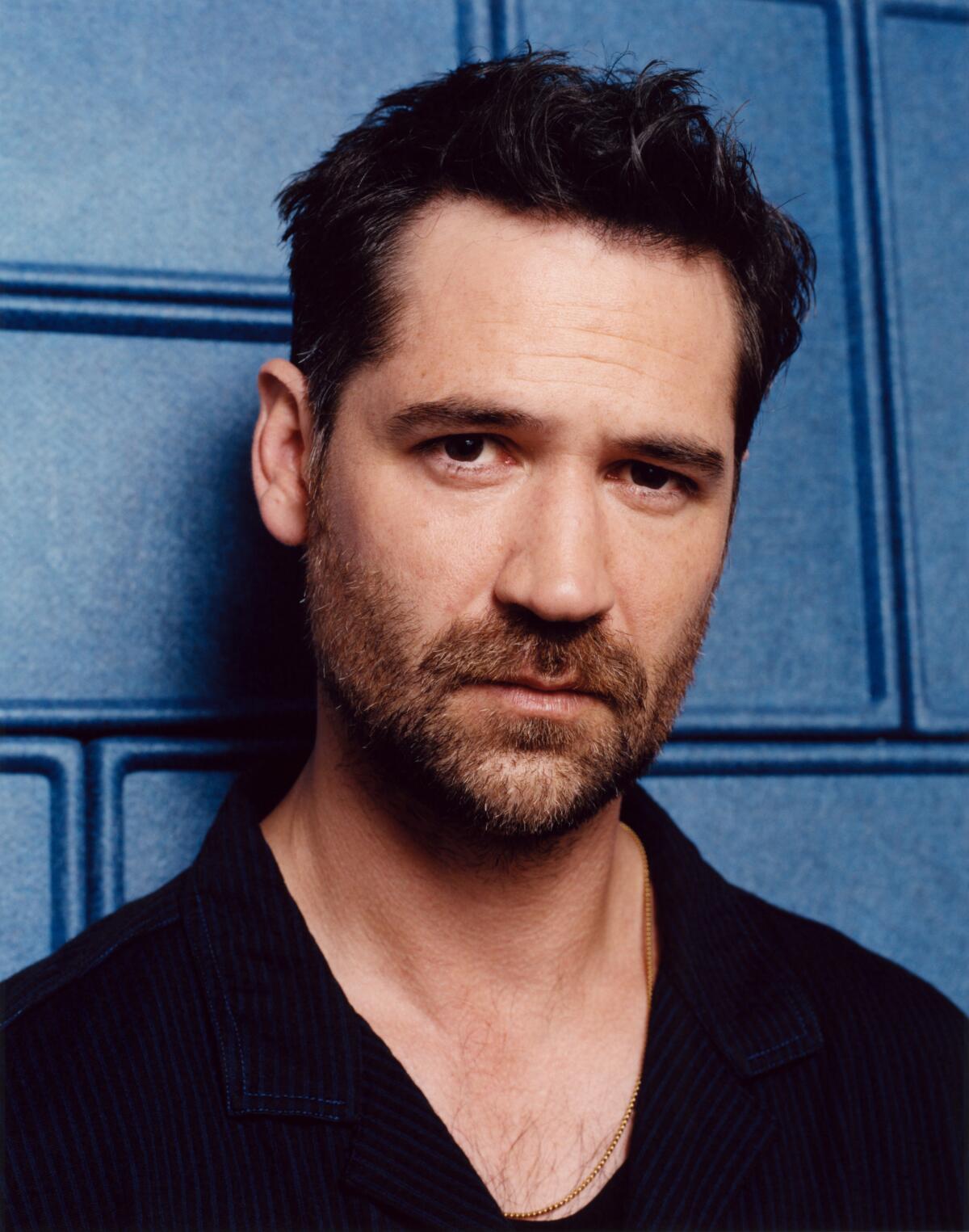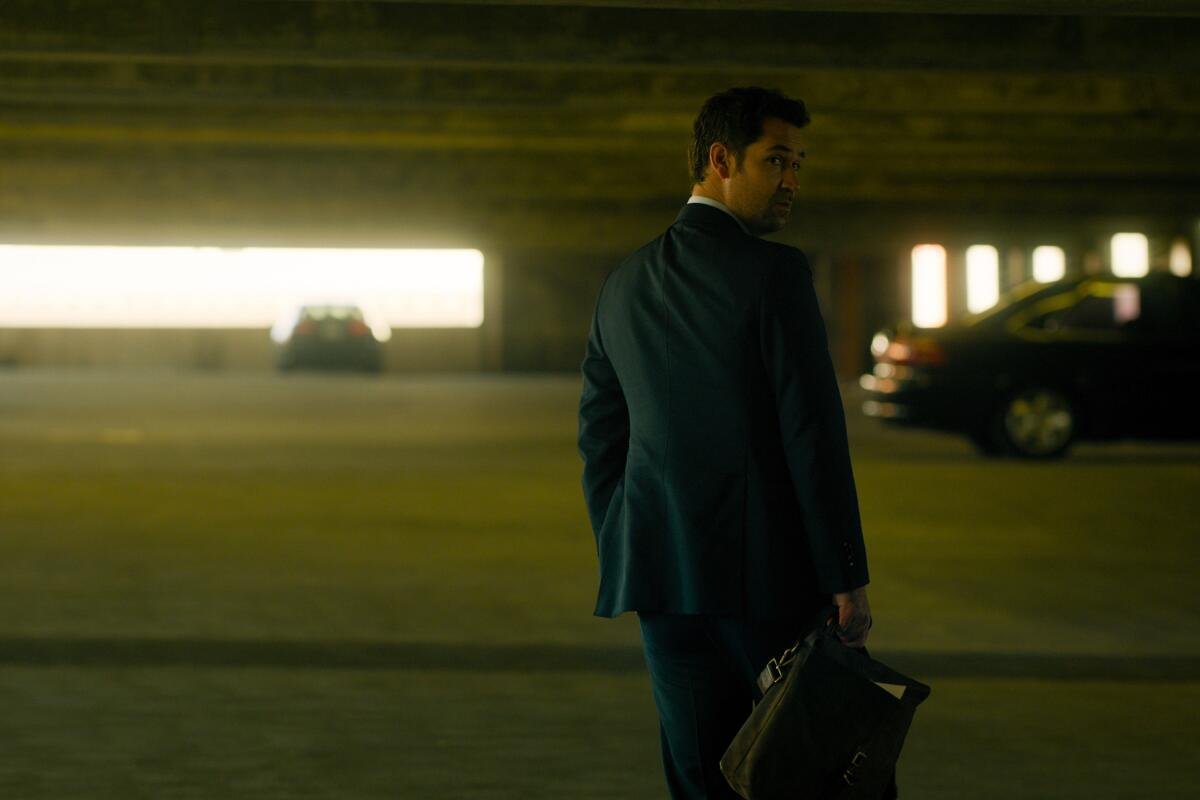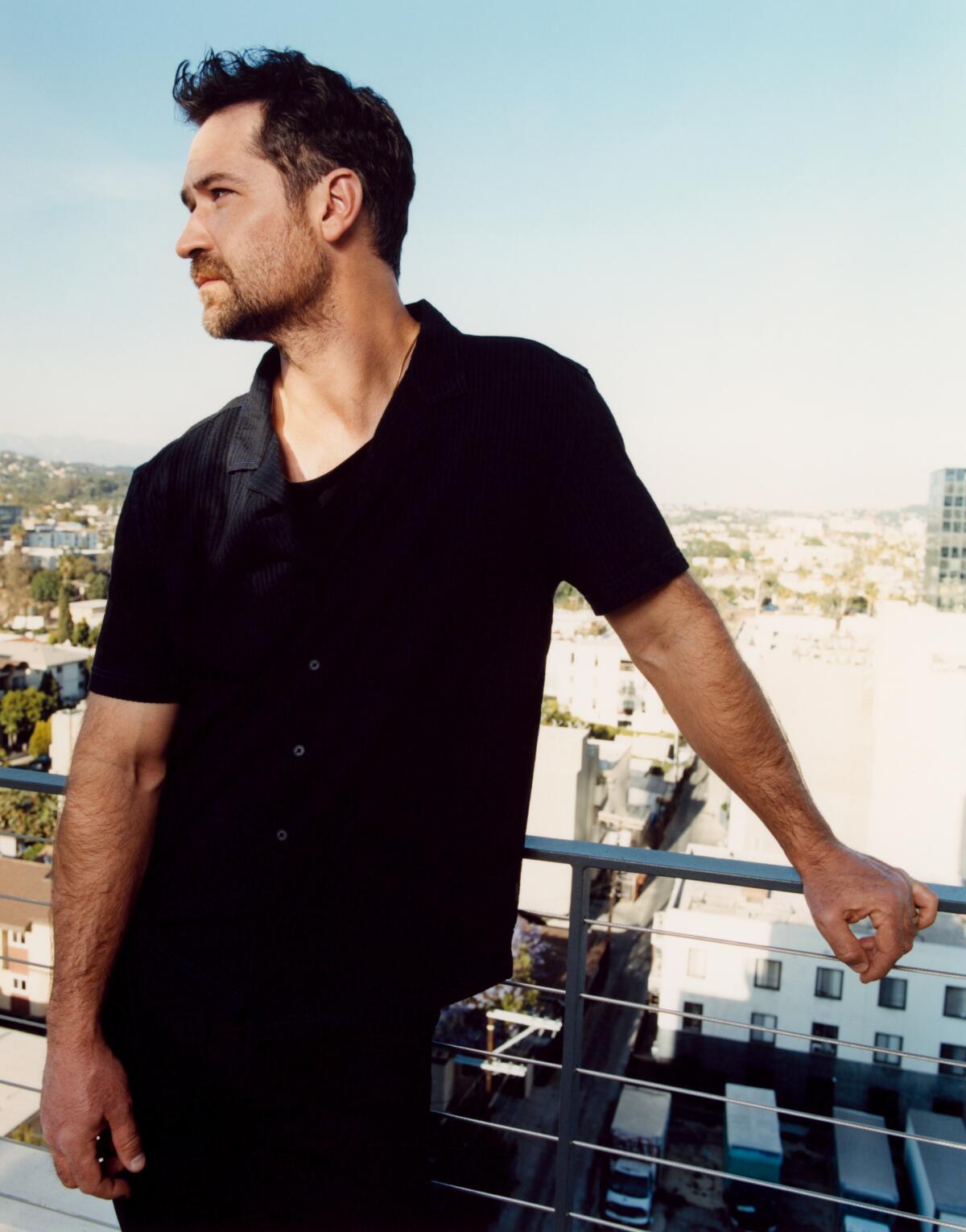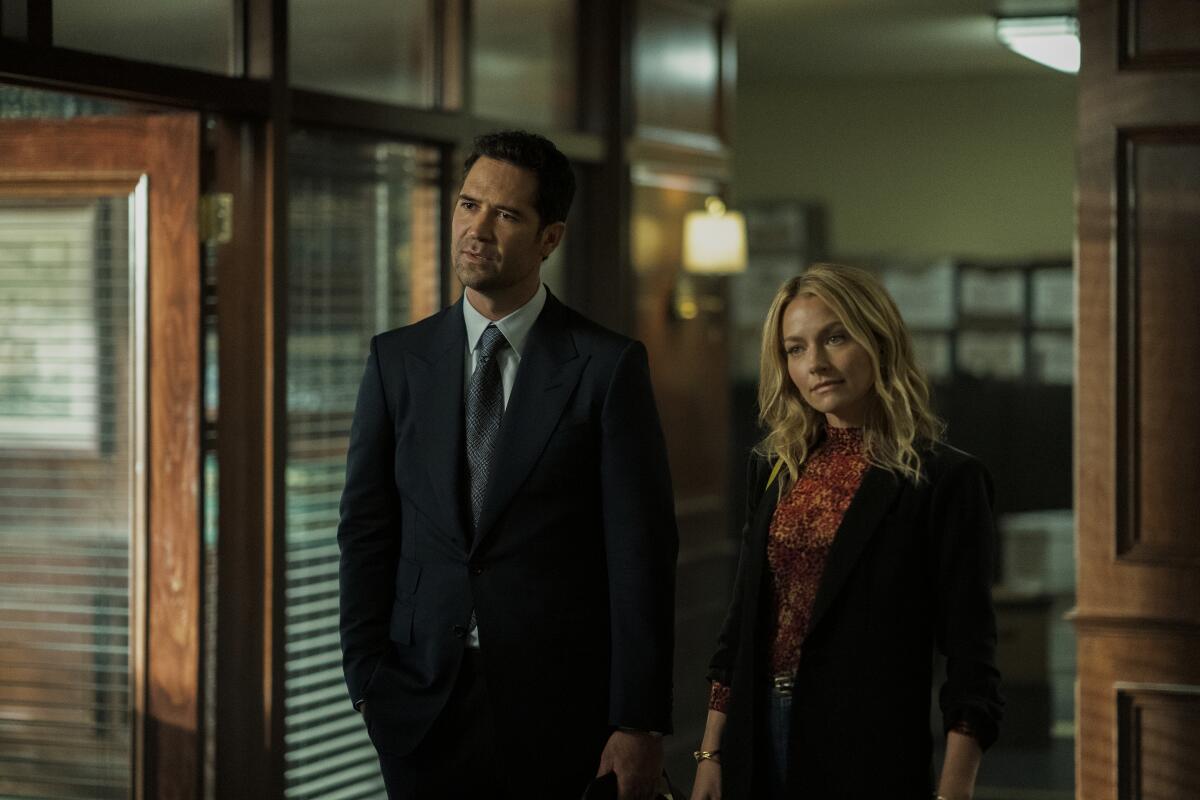The complete guide to home viewing
Get Screen Gab for everything about the TV shows and streaming movies everyone’s talking about.
You may occasionally receive promotional content from the Los Angeles Times.

Manuel Garcia-Rulfo’s most important piece of film memorabilia is also a family heirloom: the editing machine that once belonged to his grandfather.
The Mexican actor and star of “The Lincoln Lawyer,” premiering Friday on Netflix, spent summers growing up at his family’s ranch in Jalisco, where his grandfather, a film enthusiast and amateur director, would share westerns he had shot on his 16 mm camera when his children were young. For Garcia-Rulfo, now 41, the machine represents a legacy of storytelling embedded deep within him.
“Every weekend he would get all our cousins, 31 of us, together for a movie night,” he recently told The Times during an interview at Netflix’s Hollywood headquarters. In addition to the homegrown productions, the family’s patriarch would often screen classics by Charles Chaplin and legendary Mexican comedian and actor Mario Moreno “Cantinflas.”
As he got older, Garcia-Rulfo’s Aunt Lourdes took on the artistic mantle and began shooting fresh flicks with the clan’s new generation of children. The actor got his start in those playful stories: “I was the lead in most of the movies because all the other cousins were shy,” he said.
Unconcerned with pushing envelopes and cutting edges, David E. Kelley’s adaptation of the Michael Connelly novels may be a sign of things to come.
For a while, Garcia-Rulfo’s sights were set on still photography — shooting for National Geographic was the dream — and he later contemplated directing. But his involvement in high school theater led him to study acting in California at the New York Film Academy. Upon returning home, he began his professional career in local Spanish-language film projects, avoiding the soap opera route many there take.
Since then, Garcia-Rulfo has moved agilely between Mexico and the U.S., with a string of supporting parts in major releases — Steve McQueen’s “Widows,” Antoine Fuqua’s “The Magnificent Seven,” Michael Bay’s “6 Underground” — and more substantial parts in his home country, most notably in films by his friend, writer-director Manolo Caro, such as “Tales of an Immoral Couple” and “Perfect Strangers.”
“The Lincoln Lawyer,” which marks his first lead role in an American production, adapts the books by Michael Connelly, with Garcia-Rulfo as a wandering but highly effective criminal attorney in Los Angeles named Mickey Haller, whose vehicle is his primary office. In it, Garcia-Rulfo’s Mexican identity blends seamlessly into the drama.
He spoke to The Times about his worst audition, tapping into his character’s cultural specificity and how “The West Wing” and “The Good Doctor” actor Richard Schiff helped him break into Hollywood. The following has been edited for clarity and length.

At what point in your career in Mexico did you decide that you wanted to come to the United States and try your luck in fickle Hollywood?
The funny thing is that the first film I shot in Mexico, called “La última y nos vamos” (“One for the Road”), was selected for a film festival in Denver, and they invited me to come. There, Richard Schiff, the actor, saw the film. We talked after, and he said, “Manuel, if you ever want to come to work in Hollywood, I can introduce you to my agent.” The next time I came to L.A. to visit, I met with this agent, and the next day she sent me to an audition, and I got it, which was “Bless Me, Ultima.” I did that film. I went back to Mexico, and the agent was like, “You have to be here.” I decided to move here.
Did things get easier, or was that an outlier of a lucky break?
It always gets harder because you start getting more selective. At the beginning, it’s like, “I’m hungry, give me whatever there is.” Now, the roles that I want or the projects that I want, a lot of actors also want them, so you have to fight for them.
Do you remember your worst audition in Hollywood thus far? If it’s not too painful, can you share what it was and why it went wrong?
It was with [Darren] Aronofsky for “Mother!” It was for the part that Javier Bardem eventually played. I remember going in like, “I got this part.” It was a very hard scene, you didn’t know much, but I invented this whole story for the character, and I was so ready. He’s such a nice guy, but when I went in, and I don’t know why, I choked. I was supposed to cry in the scene, and I couldn’t. I remember getting out of the audition, and all that emotion that didn’t come out during the audition just started pouring out.
We surveyed The Times TV team to come up with a list of the 75 best TV shows you can watch on Netflix. As in, tonight.
At any point in your binational journey, have you ever felt like you wanted to quit?
All the time. Still do. I actually quit in Mexico. In one of the films I made there, I was too young and I was miscast. It was a horrible experience. After that, I thought, “I’m done with this,” and I quit for a year and a half. I went to the ranch in Mexico and started a lime plantation. But after that period, that’s when I came to L.A. to take a still photography course and met the agent that Richard Schiff had recommended. I’m so thankful to him. That’s when everything started again.
A major part of what you do is consistently convince others to consider you for a job. How do you deal with this aspect of the field?
There’s so much rejection. You fall in love with a character in a project that you really like, and you’re there for however many auditions, for however many months, just pouring your soul into the thing, and you get three or four callbacks, and then they might decide it’s not you. But I think I’ve started to build “cuero” or a tough skin. I’m more relaxed now. Back then I’d blame it on, “Maybe I’m not good enough.” Now I know everybody has different tastes, and that’s the way it is sometimes, the stars just don’t align.

What project do you consider your breakthrough?
Probably the “From Dusk Till Dawn” series with Robert Rodriguez. Even though my character was very small, that was very important for me, especially because of the casting director, Mary Vernieu. She cast that show, and because of that, she pushed really hard for me to be in “The Magnificent Seven,” which she cast as well. “From Dusk Till Dawn” did that for me.
“From Dusk Till Dawn” was also a big break for Eiza González. There are still few Mexican actors like you and her that have managed to carve a place in Hollywood. Many others have tried but decide to return home and focus on working there.
A lot of Mexican actors that I know come here for two months, it doesn’t work quickly, and they go back. I’m stubborn. I was here after “Bless Me, Ultima,” and I didn’t work right away, but I thought, “Now I’m doing it. Life brought me here.” And Eiza has that too.
The complete guide to home viewing
Get Screen Gab for everything about the TV shows and streaming movies everyone’s talking about.
You may occasionally receive promotional content from the Los Angeles Times.
Tell me about the process of getting cast as the lead in “The Lincoln Lawyer.” This is a character that could have potentially been played by an actor of any ethnicity.
I had to audition, and it was during the height of the pandemic. I was in Mexico, and it was over Zoom, which was the worst. I was in my room. They sent me the scenes. I read them, and the character’s words just made me want to say them out loud. I sent the audition, and then they called me for some notes on the character. I did it like three times, and that was that. I’m just very happy and thankful that a platform like Netflix and the showrunner, David E. Kelley, bet on me, not because it’s me or because I’m Mexican but because they bet on a guy that has an accent portraying Mickey Haller.
Watching the show, one can hear you occasionally speaking Spanish or casually making reference to your identity in a way that seems organic to a character like this in a city like Los Angeles. Were all these notes of cultural specificity in the screenplay from the onset?
There were some, but I pushed for more. There are some scenes where I’m eating, and sometimes the script would say, “He’s eating at a famous hamburger place.” I said, “Let’s have him eat some tacos instead.” Or if it said, “He orders a bourbon,” I would say, “No, let’s order a mezcal or a tequila.” With the language as well, I was like, “I think he would say this line in Spanish, you know?” Everyone in the production was cool with letting me do that. They would say, “As long as you’re not saying something bad in Spanish.” [Laughs.]
From the array of characters you have given life to, which do you consider the most difficult one?
Definitely this one, for the amount of work that it was to learn legal terms and huge monologues in the courtroom — long hours of work. You’d come home late, tired, and you have to at least learn the first scene for the next day. And the other scenes, you read them while they are fixing the lights. I don’t know how I did it because it’s a lead role, and with the legal terms, the language is very different. And English is already not my language.
Emotionally, I really dug deep for my character in “Sicario 2.” I don’t know if I did a good job or not, but that was emotional for me because it was very close to what we live in Mexico, with the violence. I had to do research and watch these videos and read about all these horrible things that are happening in Mexico. My character was the bad guy in the film. He’s the one that smuggles the immigrants and the drugs. That was a tough one.

Thinking of the stereotypical parts many Latino actors are offered, is the main problem that they are negative portrayals or that they are simplistic depictions of “bad people”?
When there’s a well-developed, three-dimensional character, it doesn’t matter if it’s a bad guy. As viewers, we love to see that, even though we’re disgusted by the person. But sometimes they just write the drug dealer without giving him any subtext or context to understand why this person is behaving that way. There are projects where they are just very stereotypical, and there are others where you can see everything that’s going on with the drug cartel guy.
Looking at your Instagram, I noticed that you are a big cinephile who loves to watch international and art house films. Do you actively pursue roles in less commercial fare?
Definitely. I would love to do more, but I’ve already been part of both worlds. Every time I work with somebody who has a film on the Criterion Collection, I ask them to sign my copy. Like when I worked with Steve McQueen on “Widows,” he signed my copy of “Hunger.” There’s a movie I did recently in Mexico called “Good Savage” or “El buen salvaje” by Santiago Mohar Volkow that has more of that thoughtful, artistic vibe. I was also recently in “Dos estaciones” by Juan Pablo González, which was at Sundance.
Do you still have any interest in directing, to follow even more closely in your grandfather’s footsteps?
I started shooting a short film, and then the pandemic happened. I think I’m going to do it, but I’m afraid of it, so I just keep procrastinating.
Afraid of what?
Failing, I guess. I have so much respect for it that I really want to be serious about it. I’ve taken some courses here and there, and I read a lot about directing. That’s why I love the Criterion Collection, because it shows you like all the special features on how the films were made. I have so much respect for it that when I jump in, I really want to be prepared. It’s hard to make a good movie. It’s so hard.
Since he was such a major influence on your career path, I wonder, did your grandfather live to see you act?
No, but I know he would’ve been really happy.
‘The Lincoln Lawyer’
Where: Netflix
When: Anytime, starting Friday, May 13
Rating: TV-MA (may be unsuitable for children under the age of 17)
The complete guide to home viewing
Get Screen Gab for everything about the TV shows and streaming movies everyone’s talking about.
You may occasionally receive promotional content from the Los Angeles Times.